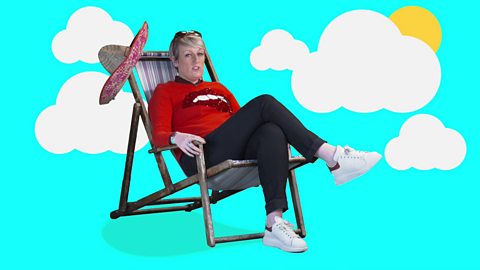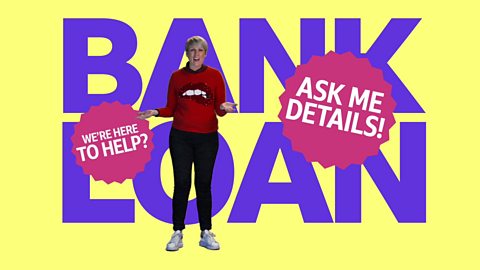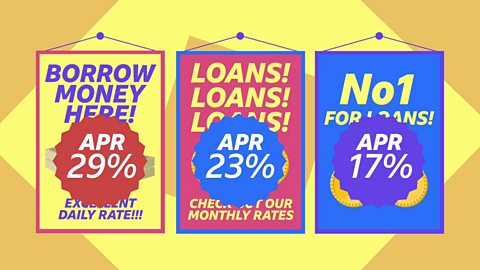Steph McGovern: So you know in schools youÔÇÖve got a building, lovely teachers, books, desks, lights, heating. Have you ever wondered who pays for all of this?
Steph McGovern: Well most schools get their money from the government which also pays for things like the police, doctors, hospitals, the army and so on. And it raises money for all of that from you.
Steph McGovern: If you buy something like a new phone, 20%, thatÔÇÖs 20p in every ┬ú1, is taxed. ThatÔÇÖs called Value Added Tax or VAT, which is money the government gets.
Steph McGovern: Then if you go to work some of your pay above a certain amount will also go to the government and thatÔÇÖs called income tax. There are loads of different taxes; thereÔÇÖs a tax on petrol, a tax on your car, thereÔÇÖs a tax called stamp duty when you buy a house, and once you're 18 you pay a tax in the local area called council tax, which pays for things like street cleaning and waste collection and looking after vulnerable people too.
Steph McGovern: Some taxes are there to discourage people from doing things that the government thinks are harmful. So that is why there are taxes on things like fizzy drinks, alcohol and cigarettes.
Steph McGovern: All together the government expects to raise more than ┬ú750bn in a year thatÔÇÖs an average of around ┬ú11,000 for every adult and child in Britain. Now there are lots of people who pay very little tax and some people who pay a lot more than that ┬ú11,000.
Steph McGovern: In most years the government doesnÔÇÖt raise enough tax to cover everything it wants to spend, this is called a deficit, and the government has to borrow money to cover it.
Steph McGovern: Some people think that taxes are too high and want to bring them down. Other people want to raise taxes and spend the money on public services. But which would you rather have? Lower taxes or more money for services? ItÔÇÖs a tricky one.
Video summary
The government collects taxes to pay for schools, hospitals, the police, the army and other public services.
We pay VAT (Value Added Tax) on many things we buy. Workers pay income tax on any earnings over a certain amount. As well as petrol and car taxes, there's stamp duty, a tax on house sales.
Everyone over the age of 18 pays council tax, to fund street cleaning, waste collection and the care of vulnerable people. Taxes on alcohol, smoking and sugary drinks aim to discourage what the government views as harmful behaviour.
£750 billion is raised annually in tax, or around £11,000 per person. But in most years, this won't cover all the government's spending and it borrows money to make up the deficit.
So should we raise taxes? Or lower them and have poorer public services?
Teacher notes
Choose from a selection of activities to help students learn more about tax.
Before watching
Questions to get the class thinking and talking
- What is tax?
- What taxes do we pay?
- Why do we pay taxes?
Establish tax is money we pay the government to fund public services.
Using the film
You may wish to play the film twice: once straight through and once with pauses, to take students' comments and questions. Encourage the students to make notes as they watch.
After watching
- Role-play - Ask the students to work in pairs. Two workers compare their payslips. They've both had £400 taken this month in income tax and national insurance. One worker complains about the money taken. The other tries to justify it, pointing out what our taxes pay for.
Activity ideas
Tax quiz - Students could use the video transcript to devise multiple-choice questions about the taxes we pay, for instance: 'What is the tax on house sales called? (A) The Homes Levy, (B) Stamp Duty, ┬® Doorstep Duty, (D) Community Charge. Answer (B)'.
Glossaries - Students could compile glossaries of financial terms used in the film clip, along with their own definitions. This encourages them to clarify their understanding of key vocabulary. Terms might include: 'VAT', 'stamp duty', 'council tax', 'income tax' and 'deficit'.
Tax take - Students could calculate the monthly tax take for various workers, at the 2019 rate of 20% on earnings above £12,500 a year (below that, you don't pay income tax). People earning over £50,000 a year are taxed at 40%.
Figures to work from: a part-time cleaner earns £11,000 , a junior salesperson £16,800, an office manager £28,000 and a Head Teacher £54,000 a year.
- New tax? - No tax is ever popular, but how do we decide what is taxed? Students could work in pairs to come up with an idea for a new tax, to either discourage harmful behaviour or encourage positive action.
Who would pay this tax? How would it be collected? Should someone's ability to pay be taken into account? Students could make one-minute presentations of their tax proposals to the class.
My tax week - Students may not yet pay income or council tax, but they do pay other taxes. Ask them to list what they have paid tax on (for instance 5p for a plastic bag, VAT at 20% on most purchases and 18p per litre on sugary drinks). What taxes do their parents or carers pay on their behalf (car tax, fuel tax)? Challenge students to estimate how much their personal tax bill has been this week.
Debate - Ask, 'Which would you rather have? Lower taxes or more money for services?' Gather the students' responses and prompt further debate with:
- Should we look after everyone's welfare? Or should people look after themselves?
- Are there benefits to society from public services?
- Should we be able to choose personally the services our taxes fund?
- Do lower taxes inspire people to work harder?
- Would you value school more if you had to pay for it yourself?
- What should never be taxed?
At the end of the debate, the class could take a vote on whether they would prefer higher taxes and better services, or lower taxes and poorer services.
Supported learning and SEN
Each year in the UK, we pay around £11,000 tax per person. If it was up to you to decide what your tax was spent on, what would you choose? Ask students (with any necessary support) to draw and colour a pie chart showing what fraction of their £11,000 they would spend on schools, hospitals, the army, police, etc.
Closing the lesson
Divide the class into teams. Hold a tax quiz, using the students' multiple-choice questions.
This is a fun and snappy way to revisit the lesson material, reinforce the learning and check the students' understanding.
Follow-up task
Students could find out more online about what our taxes fund. They could use search terms such as 'UK government spending' and 'how our tax is spent'. Students could write a short report on what they discover.
This short film meets and extends curriculum requirements for financial literacy at:
- Key Stage 3 and Key Stage 4 in England (Citizenship and Personal, Social, Health and Economic Education)
- Wales (Mathematical Development and Personal and Social Education)
- Northern Ireland (Mathematics and Numeracy and Learning For Life and Work)
- Third and Fourth Level and the Senior Phase in Scotland (Mathematics and Numeracy, Social Studies and Learning, Life and Work).
Pensions: Where do you get money from when you stop working? video
In about 50 years you can retire, but you'll need money - that comes from a pension. The sooner you start saving for one the easier it is, says Steph McGovern.

Credit and Debt: What happens when you borrow money? video
Steph McGovern takes a look at the ways in which you can borrow money, as well as the costs involved.

Interest: How does compound interest work? video
If you borrow money, you will usually have to pay back more than you borrow. Steph McGovern explains why both debts and savings keep on getting bigger.
